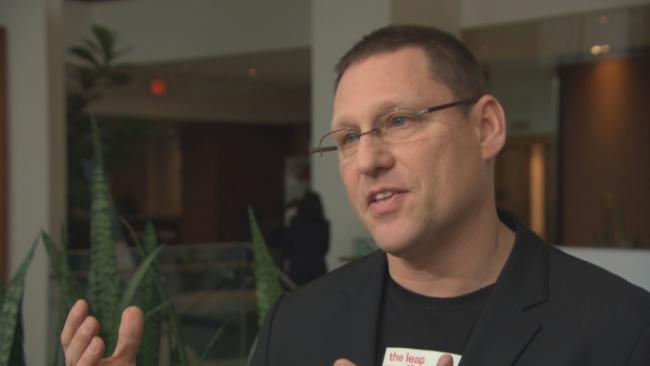Articles Menu

Filmmaker says Leap Manifesto could expand into a larger political platform
There could come a time when the Leap Manifesto, a five-page document that calls for a radical rejigging of the Canadian economy, moves beyond its existence as a movement, says one of its chief champions.
But Avi Lewis isn't signing up for political office just yet.
"I engaged in a long political process and a really deep consultative process among allies around the country about whether it would be useful for me to enter the [NDP] leadership race and the general consensus among many is that it would and it's just a bad time in my life," the filmmaker told CBC The House host Chris Hall.
But Lewis, whose father Stephen led the Ontario New Democratic Party in the 1970s, said the Leap Manifesto is inching towards political party territory, with talks of publishing a national platform.
"We're talking about some crazy stuff like a national convention a year from now and a platform that actually brings a deeper analysis than those 1,400 words in the Leap Manifesto…. We're considering all kinds of things and this is not the last you will hear," he said.
Lewis compared the Leap movement to Indignados, Spain's anti-austerity movement that became a political party, and Bernie Sanders supporters in the United States who are still trying to figure out what to do after his concession.
"It's a critical question... I think the social forces in Canada need to be more than movements but less than parties," Lewis said. "We have to careful to not denigrate the power of grassroots action."
The Leap Manifesto, slagged by critics as "madness"and "naive," calls for Canada to be "powered entirely by just renewable energy" within 20 years, to end trade deals that don't benefit local economies and pitches the idea of a national childcare program and universal basic annual income.
"It's actually about giving power to those who have been disempowered and it's about taking some power away from people who have too much," said Lewis.

Director Avi Lewis, right, and author Naomi Klein of the film 'This Changes Everything,' stand for a photo on the red carpet during the Toronto International Film Festival in 2015. (Aaron Vincent Elkaim/Canadian Press)
The Leap Manifesto went public a year ago, during the 2015 fall election campaign, and was met both praise and criticism. It ended up playing a prominent — even divisive — role at the NDP convention last spring, which ended with members telling leader Tom Mulcair they wanted him replaced. But since then, no one has officially put their hat in the ring to replace him.
Lewis says the manifesto, which hasn't received much mainstream light since the NDP's Edmonton convention, is still "going strong."
"It's been a wild ride of a year," he said.
While the document was panned by some high-ranking New Democrats — Alberta Premier Rachel Notley called it "tone deaf" — Lewis says there's been pickup amongst grassroots groups.
It's "a once-in-a-generation constellation of social movements, from labour unions and environmental groups, indigenous rights groups, migrant and refugee advocates and others who came together around these 15 demands to get Canada off fossil fuels," he said.
'I think the great master skill of the Liberal Party of Canada is to try and thread the needle and keep everyone happy.'- Avi Lewis
The Leap Manifesto organization is also working on a proposal with the Canadian Union of Postal Workers to convert Canada Post's fleet into electric vehicles and push for postal banking as a way to fund green investments.
Lewis called the manifesto a non-partisan project, not necessarily beholden to the NDP (although he believes the NDP could regain momentum by reconnecting with "social movement energy"). He said he was "charmed" to hear Tzeporah Berman, co-chair Alberta's oilsands advisory working group, arguing on CBC's The Current that Canada can't afford to build a pipeline and abide by its Paris agreement commitment.
"That's an Alberta government appointment who is now saying the very same things we were excoriated for last spring," Lewis said. "The Leap has expanded the sense of what's politically possible and it's provoked a debate about a much more urgent and transformative approach to dealing with climate and other social crises in Canada."
In April, Lewis told The House he wanted the Liberal government to read the manifesto ahead of its big environmental decisions. A ruling on the TransMountain expansion project is due before Dec. 19.
These days, the activist predicts a battle of political capital between appeasing voters who support pipelines and voters who ditched orange for red in the last election.
"I think the great master skill of the Liberal Party of Canada is to try and thread the needle and keep everyone happy and I think this particular iteration of the Liberals is maybe better at it than any previous one. But I think that there's a fundamental conflict in the things that they've promised and the way they're trying to thread that needle — it's just not going to wash," he said.
"They are going to do things that are really going to set off the progressive voters that they captured from the NDP. I think there will be a reckoning."
[Top photo: Documentary filmmaker and co-author of the Leap Manifesto, Avi Lewis, says he has been courting the Liberal government to adopt parts of his ambitious climate change agenda. (CBC News)]